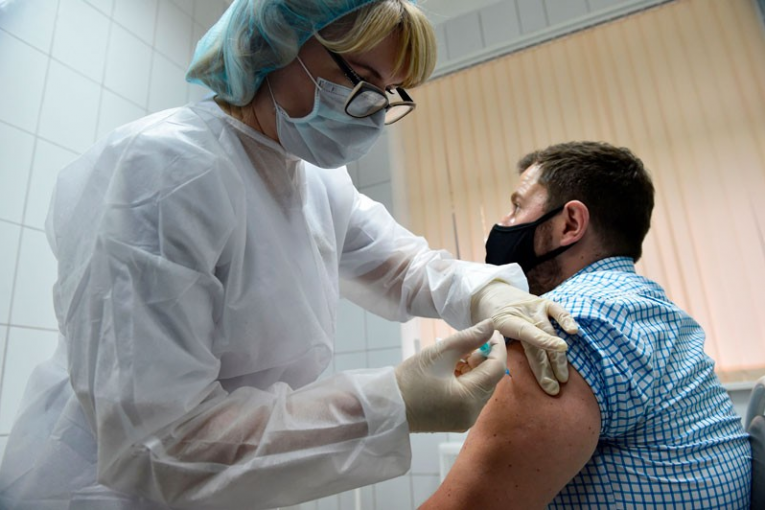

By Macy Lu
YOLO COUNTY — Yolo County and the City of Davis authorities are flustered after learning that changes to the statewide vaccination process will reduce the volume of doses counties can receive and unravel Yolo’s local sign-up system targeting underserved communities.
California recently announced that it will be partnering with third-party providers such as Blue Cross Blue Shield to administer the vaccines. It will also be requiring individuals use “MyTurn” a statewide sign-up portal to register for vaccinations.
“[Yolo County’s] slice of the pie will shrink while these other providers will get more doses through this new process,” explained Yolo County Administrator Patrick Blacklock, “which means we really need to refine and bring into a sharper focus our efforts for the uninsured and underserved.”
On the whole, positivity and case rates in Yolo County have been falling. This week, Yolo boasted a low positivity rate of 2.8 percent among all those tested, down 0.8 percent from the previous week. Its number of cases per 100,000 also dipped from 18.8 to 13.7, though not enough to shift the county out of the purple zone.
Ten percent of Yolo residents have already received at least one of the two doses required by the Pfizer and Moderna vaccines. Furthermore, the list of entities permitted to provide vaccinations is expanding as early as this week.
The Federal Retail Pharmacy Program will be allocating doses to retailers such as CVS as well as to federally qualified health centers such as CommuniCare.
Statewide, California has started vaccinating individuals within Tier 1 of Phase 1B, including those who are 65 years or older, first responders, education and childcare workers and food and agriculture workers.
Under state decree all four categories of people are equally eligible for the vaccination. However, since Yolo residents 65 years and older are “141 times more likely to die from Covid-19 than those under 50,” Yolo authorities are prioritizing that group of people above the rest.
“The focus is on reducing deaths as opposed to reducing infection spread because we have such limited doses,” emphasized Blacklock.
Other counties with similar trends that have reached this same conclusion include San Francisco, San Mateo, Santa Clara and Contra Costa.
For the present, Yolo is maintaining its “big and small hybrid” approach to vaccination.
“First come, first served” (based on online appointments) mass vaccination clinics in Woodland, Davis and West Sacramento are serving the general population of those 65 and older.
Meanwhile, a small number of community based organizations are “going door-to-door” collecting sign-ups for clinics commissioned to serve “unincorporated areas” such as Esparto and Knights Landing.
Deciding when to shift focus from the 65 years and older group to another is “more of an art than a science,” Blacklock stated.
One reason for this is that the county will not know until each Tuesday how many doses the state will allot for next week. As Blacklock clarified that “it’s very hard for us to predict what volume of vaccination we will be able to provide even a week out.”
Another is that it is difficult for authorities to track “on a real time basis” how many of the 28,000 elderly Yolo residents have been vaccinated. As a result, the county is relying on the number of daily vaccination sign-ups as an indicator for when to transition to the next group of people.
If vaccinations for the 65 and older subset no longer stretches clinics to their daily capacity, then the county will start distributing supplies to other members of Tier 1 of Phase 1B.
Again, Yolo County is not alone in its vexation.
Counties across California “have shared with the state that the lack of predictability and a lack of transparency with the healthcare systems make it very difficult for counties to plan thoughtfully on the next few weeks,” Blacklock highlighted.
As a consequence of California’s plan to administer a portion of vaccines through large, third-party providers, counties will receive a smaller share of the total number of doses, forcing them to budget even more carefully than before.
“It’s another point of frustration for counties that just when we are getting our feet on the ground, here comes a significant landscape changing event,” said Blacklock.
“The role of the county,” added Yolo County Supervisor Don Saylor, “will probably be more and more focussed on…those who won’t be caught up in the regular health systems.”
The state’s new “MyTurn” sign-up process is another impetus for rapid adjustments in Yolo County’s vaccination plans.
The state’s mandate for providers to use MyTurn for vaccine sign-ups will, “at least initially,” negate Yolo County’s interest card sign-up system, which has already registered 30,000 individuals.
Blacklock assured that if worst comes to worst, county authorities are prepared to “work with community members to individually re-register through MyTurn.”
Despite deferring to the state’s mandate, he was skeptical about whether or not MyTurn will allow for the same quality of “targeted efforts” already happening in Yolo.
“We don’t know the answer…and it’s supposed to be turned on in Yolo County as early as this week,” said Blacklock. “It probably emphasizes, if nothing else, that the county will really need to stay focussed on the uninsured and the underserved going forward.”

Macy is a junior from Orange County, CA, studying Communications and English at UC Davis. She loves meeting people, reading books, and writing creatively.